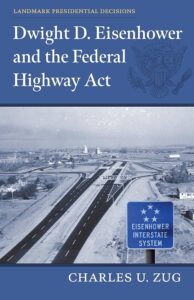Dwight D. Eisenhower and the Federal Highway Act
 President Dwight D. Eisenhower is remembered by many as the originator of the American Interstate Highway System. He is also praised for restraining executive overreach, restoring the separation of powers, and presiding over an era of governmental equanimity and goodwill.
President Dwight D. Eisenhower is remembered by many as the originator of the American Interstate Highway System. He is also praised for restraining executive overreach, restoring the separation of powers, and presiding over an era of governmental equanimity and goodwill.
In Dwight D. Eisenhower and the Federal Highway Act, Charles Zug contests all these assumptions. Through archival research, Zug shows that Eisenhower’s attempt to lead highway expansion during 1952–1955 ended in dismal failure. Far from championing the separation of powers, Eisenhower sought to marginalize Congress from the legislative process by secretly writing a transformative highway bill within the confines of his White House. And once it was announced, Eisenhower’s highway plan was almost universally panned: Ike’s own comptroller general deemed the plan’s funding mechanism “illegal” before a bipartisan majority laughed it out of the Senate in the spring of 1955. The highway bill that did eventually pass Congress in 1956, and that went on to launch the modern interstate system, was written by congressional Democrats and emphatically rejected Eisenhower’s basic approach to highway reform.
Drawing on executive politics, American political development, and leadership studies, Zug uses the Federal Highway Act to argue for a foundational reassessment of Eisenhower’s legacy as highway founder, president, and political leader.
“This nuanced, highly readable, and deeply informative book unpacks when and why presidential leadership matters by focusing on a single case (the Highway Act) and a single president (Eisenhower) to help us see when the president was important in pushing the act through and when other actors provided the hidden-hand leadership that led to success.”—Michael A. Genovese, author of The Modern Presidency: Six Debates That Define the Institution
“This is an impressive study. Melding the best of biography, history, and political science, Charles Zug captures Dwight D. Eisenhower’s political philosophy and applies it to the formulation of one of postwar era’s most important legislative achievements. This richly detailed book takes readers inside the workings of the Eisenhower administration and the law-making warrens of Capitol Hill. With incisive analysis backed by meticulous research, Zug has produced a thought-provoking work on the president, Congress, and the genesis of the Federal Highway Act.”—Yanek Mieczkowski, author of Eisenhower’s Sputnik Moment: The Race for Space and World Prestige
Published:
University Press of Kansas, Landmark Presidential Decisions Series, February 2024
Author:
Charles Zug is an Assistant Professor of Constitutional Democracy and Political Science at the University of Missouri
